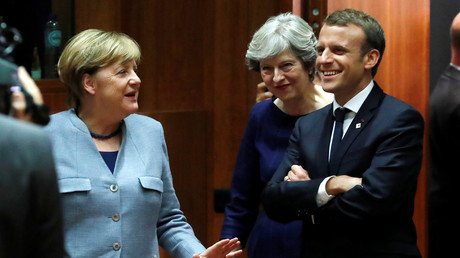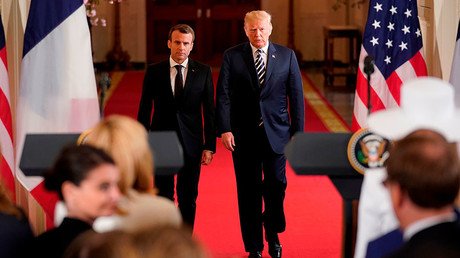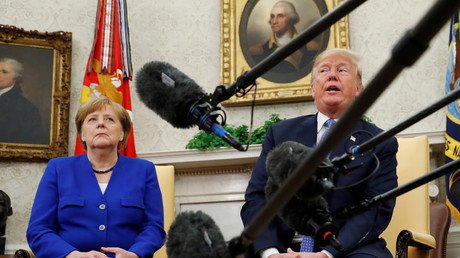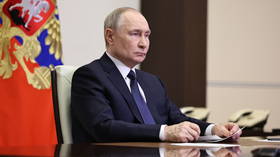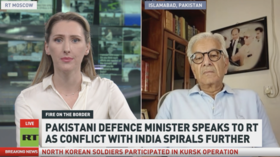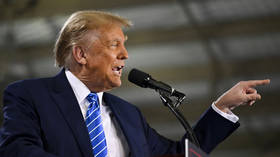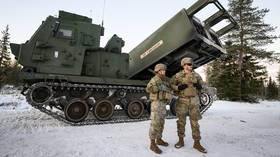Rejecting EU attempts to keep Iran deal + staying in Syria = more regime changes on the US mind?
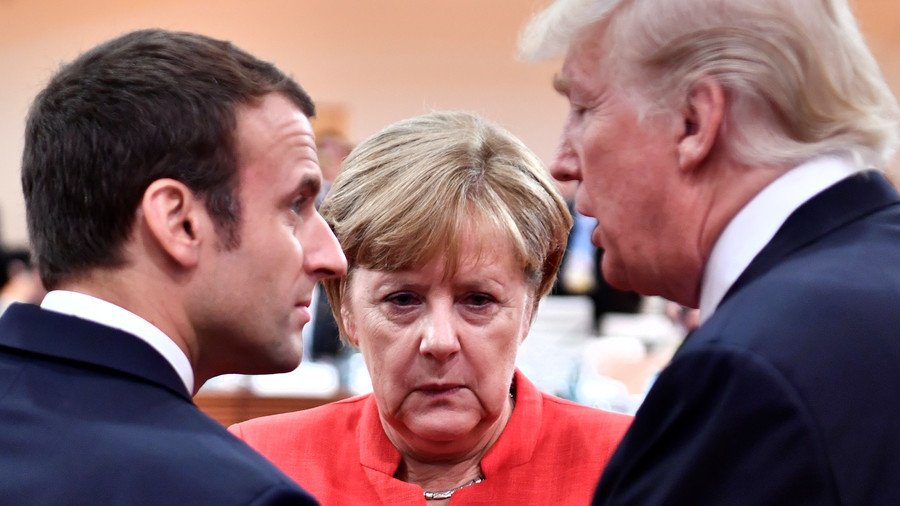
French President Emmanuel “Little Macro” Macron and German Chancellor Angela “Mutti” Merkel might just as well have stayed home and saved the carbon emissions spewed out during their flights to Washington.
Both came with the same task – to convince President Donald Trump not to pull the US out of the Joint Comprehensive Plan of Action (the JCPOA) regarding Iran’s nuclear program. It was a fool’s errand.
Macron, in every way the junior representative of the Franco-German partnership at the heart of the European Union (EU), was the guest of honor at Trump’s first formal state dinner. He exploited his improbable “bromance” with Trump and his participation in last month’s strike on Syria for all he was worth – which, in the end, wasn’t much. Merkel, whose dislike for Trump is notorious and mutual, fared no better.
As a possible “sweetener” for Trump to keep the United States in the nuclear deal, both Macron and Merkel (M&M) were reluctantly willing to consider some kind of side deal, that would leave intact the JCPOA as agreed-to while addressing American concerns about inadequacies in the agreement.
The idea was that, if a concord could be reached among Trump, Macron, and Merkel, that would force the EU (which is a separate signatory to the JCPOA) to go along. Britain would then fall into place too, with the aim of then presenting a united western front to Russia and China. Whether that would be enough to sway Moscow and Beijing is another matter.
The Russians, in particular, have painful experience with Washington regarding matters they thought were settled, only to see the western side contemptuously discard any commitments: NATO expansion (after a promise not to expand eastward “by one inch”), US withdrawal from the Anti-Ballistic Missile (ABM) treaty (reportedly at the urging of John Bolton, now back in power as Trump’s National Security Adviser), UN Security Council (UNSC) Resolution 1244 regarding Kosovo’s status as an autonomous province of Serbia (until Washington and Brussels insisted on independence), UNSC approval for a limited “humanitarian mission” in Benghazi in 2011 (until NATO opted for an unlimited kill-Ghaddafi mission), or the various agreements on Ukraine (the February 2014 power-sharing deal between President Viktor Yanukovych and the “Maidan” leaders that didn’t even last one day, the Minsk I and II agreements that were never fully implemented), and so forth.
So even if the Russians and Chinese (and the Iranians) consented to an ex post facto “fix” to the JCPOA, what would prevent demands for further “fixes” down the road? Or for that matter, what stops the US from disregarding the deal altogether and attacking Iran?
Just a few days after Macron and Merkel left Washington, it became clear why their efforts to exert influence over US policy had been a waste of time. In his April 30 primetime briefing on Israeli television, Prime Minister Bibi Netanyahu showed that he, not the M&M midgets, was the one with real clout in Washington. France, Germany, even Britain – they can eat his dust.
It is not necessary here to lay out the specifics of Netanyahu’s case, that Iran is in violation of the JCPOA. As veteran arms control verification expert Scott Ritter, a sharp critic of Netanyahu, observes, Netanyahu was pushing on an open door: ‘The legal and practical fallacies inherent in Netanyahu’s presentation may ultimately not matter. In the end, Netanyahu was addressing an audience of one – Donald Trump. This “intelligence driven briefing,” regardless of the veracity of the information used to underpin it, will be used by Trump to bolster a decision he has already made to withdraw from the JCPOA, setting America and the world on a path for which there can only be one destination – war with Iran.’
Macron and Merkel were blindsided by Netanyahu. We can be sure that Trump was not. Even while Trump was entertaining his high-level French and German guests, he knew he was gaming them. He doubtlessly was aware that Netanyahu would cut the legs out from under them right after they left Washington.
It is now a secondary question whether or not Trump will pull the US out of the JCPOA on the next threshold day of May 12. Armed with Netanyahu’s claims (which are treated as gospel across the American political establishment and in almost all of the media), Trump can present France, Germany, Britain, and the EU with an unsavory choice: Either sign on to maximalist US demands for blanket revisions to the agreement, immediately, without any fuss; or (the more likely course at this point) wait until the US pulls out, then support the same demands in the form of an ultimatum to Tehran – backed up with reimposition of sanctions and the threat of military force. (And if they balk, or seek to uphold the JCPOA even without the US in it, get set for secondary sanctions on European companies doing business with Iran.)
Simply put, Netanyahu and his favorite Arab sidekick Saudi Crown Prince Mohammed bin Salman are in the driver’s seat. So much for “America First.”
Developments with respect to the JCPOA are consistent with those in the other major theater where US policy, led by Israel and Saudi Arabia, clashes with Iran: a stepped-up war in Syria. According to the Israeli site DEBKAfile, during his April 29 visit to Israel – the day before Netanyahu’s presentation – newly minted US Secretary of State Mike Pompeo met with the Israeli prime minister and gave him a thumbs-up for military action. According to that source:‘Pompeo, on his first Middle East Trip as Secretary of State, reiterated in Tel Aviv – as he did in Riyadh earlier Sunday – that the nuclear deal will need to be fixed or it would be abandoned by President Donald Trump’s [sic] on May 12. Standing alongside Netanyahu, the secretary backed Israeli efforts to counter Iran in Syria. He said the US is committed to “rolling back to the full range of Iranian malign influence in Syria,” specifically mentioning “Iran’s missile systems, its support for Hezbollah, its importation of thousands of Shiite fighters into Syria.” Pompeo added, “We strongly support Israel’s sovereign right to defend itself.” [JJ: Evidently Syria has no such sovereign right.] DEBKAfile: This was taken as a US green light for Israel to take on the elements threatening its security from Syria. The secretary also stressed that the US would continue to fight ISIS and not tolerate the Assad regime using chemical weapons.’
Despite the pro forma references to chemical weapons (a false flag pretext) and ISIS (at most a side show), the real targets are the Syrian government and its Iranian (and Russian) backers – the primary forces fighting against ISIS, al-Qaeda, and other jihadist groups. In particular, Israel believes it has carte blanche from Washington to hit any Syrian and Iranian assets it pleases. For the time being, there is a greater degree of caution regarding the Russian presence but that cannot be considered any secure protection, especially if Moscow seeks to upgrade Syria’s air defenses.
As far as Washington is concerned, there are two possible outcomes in Syria. The preferred one is our old friend regime change – Assad must go. If that proves impossible, the second outcome acceptable to Washington is some form of partition, either internally (like the autonomous Kurdish region in Iraq) or a breakup of Syria (like Yugoslavia and the USSR). Most important would be creation of a Sunni entity outside of Syrian control or Iranian influence, as Bolton called for in 2015.
Either way, Syria is viewed mainly as a chessboard piece in a larger game: Irania delenda est.. Israeli Defense Minister Avigdor Lieberman has said “the Iranian regime is in its final days and will soon collapse.” The pieces are falling into place for a repeat of 2003, with the “q” in Iraq changed into an “n” for Iran. A number of Washington big shots, including many with influence with Trump, are supporters of the terrorist Islamic-Marxist – and of course Saudi-funded – “People's Mujahedin” (Mojahedin-e Khalq; MEK). Despite no discernible domestic support in Iran, MEK is being groomed as the core of a replacement “democratic” regime to be installed at the appropriate time, a kind of collective equivalent of Ahmed Chalabi who was “parachuted” into Iraq as Washington’s satrap in 2003.
The fate of the Iran nuclear deal and the course of the war in Syria are two sides of the same coin. The questions of whether or not Iran did have a military nuclear program, or lied about it, or is capable of restarting one are today as irrelevant as whether or not Saddam Hussein really had “weapons of mass destruction” (WMDs) in 2002. Claims of Iran’s having violated the JCPOA are significant mainly as props for what comes next.
WMDs or no WMDs, the current Washington administration – that includes some of the very same people who served in the George W. Bush administration – has decided on regime change in Iran the way they had earlier decided on regime change in Iraq. If that can be done via political and economic means, they’re happy to go that route. It military force is needed, that’s on the table too.
The statements, views and opinions expressed in this column are solely those of the author and do not necessarily represent those of RT.

